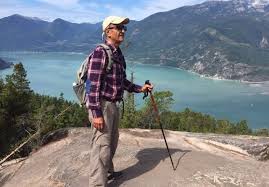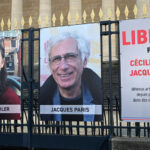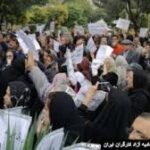
JANE GREEN assesses the latest unexplained death in custody in the Islamic Republic of Iran
THE plausibility of the claims of President Hassan Rouhani to be leading a “reformist” government in Iran took another blow last week, with the death in custody of prominent environmental campaigner Kavous Seyed Emami.
The death of Seyed-Emami follows a further crackdown by the Iranian authorities after widespread protests demanding political and economic reform spread to at least 80 Iranian cities earlier in the year.
Environmental issues, such as pollution, water scarcity and the drying up of wetlands were amongst the issues contributing to public discontent.
Iranian prosecutor Abbas Jafari-Dolatabadi is quoted by Iranian News Agency Ilna as claiming: “This person is one of the accused and given he knew there is a torrent of confessions against him and he confessed himself, unfortunately he committed suicide in prison.”
As a founder of the Persian Wildlife Heritage Foundation, Seyed-Emami’s main concern was the protection of the Asiatic cheetah, an endangered species of which it is believed only 50 remain.
Several other members of the foundation remain in jail while the deputy head of the Environmental Protection Organisation, Kaveh Madani, was detained for 72 hours over the weekend.
The arrest of Madani is a particular blow to Rouhani who last year tempted him from his position at Imperial College London for the government job.
Rouhani has been keen to show that the government is opening opportunities for Iranians living abroad.
The intelligence apparatus and the judiciary appear to have other ideas, however.
Their suspicions about foreign influence are such that Seyed-Emami, along with other colleagues, was arrested on charges of spying for a foreign power.
Claims by the security forces that Iranian-Canadian Seyed-Emami was a Mossad agent have been vigorously denied by his family, while the Canadian government is also pressing Iran for answers about the fate of one of its dual nationals.
The trumped-up basis for the arrest of Seyed-Emami was the claim by Iranian authorities that he and his associates used surveys of endangered Asiatic cheetahs as a pretext for spying in strategically sensitive areas.
Not surprisingly, the government has presented no evidence for the allegations. There is concern among the environmental community that the group has been targeted because many of its members are binational figures who were educated in the West and have connections with international conservation groups.
The death of Seyed-Emami has prompted an open letter to Rouhani from four academic societies, expressing their shock at the situation and stating that “the news and rumours related to his arrest and death are not believable.”
In its efforts to pass off the death as suicide, the regime has shown a number of parliamentarians video footage of Seyed-Emami while in Evin Prison in Tehran.
This includes him taking off his shirt, allegedly used to hang himself, leading parliamentarians to conclude he was “preparing for suicide.”
The authorities also claim that Seyed-Emami’s family did not request an autopsy following his death, a claim which the family’s lawyer, Arash Keykhosravi, strongly disputes.
Seyed-Emami’s case is the latest in a long line of deaths in custody which are either unexplained or implausible in their explanation.
The Iranian regime has a human rights record which, put kindly, is indefensible.
The Committee for the Defence of the Iranian People’s Rights (Codir), which has campaigned for Iranian political prisoners for over three decades, regards the practice of the regime as one of extra-judicial execution, contrary to natural law and internationally recognised judicial practice.
Recent developments follow the concerns expressed earlier this year in Iran where tens of thousands of people in many towns and cities protested against the policies of the autocratic regime.
The protests were against the destructive economic policies of the regime, its brutal violation of human and democratic rights, disregard for the ILO conventions regarding workers’ rights and its widespread corruption.
Young people have been the main victims of the regime’s policies, including more than five million unemployed graduates.
Those who demonstrated were predominantly young and from poor working-class districts demanding fundamental economic, social and cultural change — jobs, a living wage, dignity, respect and justice.
Brutal tactics were used by the security forces and the regime’s paramilitary militia to violently break up these mainly peaceful demonstrations by ordinary people.
At least 20 demonstrators have been killed and more than 3,700 people arrested and taken into custody.
The security forces have raided and occupied university campuses in different parts of the country to stop the student movement from joining the protests.
A significant number of university students not involved in any protest demonstration were arrested at home or on the campuses of their universities. The authorities have claimed that this illegal measure is “preventative.”
At least two of the students arrested are known to have died in custody.
Codir has consistently supported the view expressed by the people of Iran that, based on their own history and experience of recent tragedies in the Middle East, they reject outside intervention in the internal affairs of Iran under any pretext whatsoever and believe that the future of Iran should be decided only by the Iranian people themselves.
Campaigners inside the country fear that continued human rights violations and disregard for international law may be used as a pretext for outside intervention.
The death in custody of dual nationals such as Seyed-Emami only serve to fuel that fear.
The recent words of Israeli Prime Minister Benjamin Netanyahu, that Iran is not only a threat in the Middle East but the greatest threat to the world, add to the fear of outside intervention.
Codir believes that the realisation of the demands of the protesters for peace, progress and social justice is the best guarantee for Iran’s independence and for genuine popular sovereignty.
This is the only sure way to guard against foreign interference in the internal affairs of the country.
Jane Green is national organiser of the Committee for the Defence of the Iranian People’s Rights.












 Posted in
Posted in 











